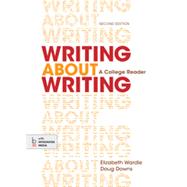The conversation on writing about writing continues on the authors' blog, Write On: Notes on Writing about Writing (a channel on Bedford Bits, the Bedford/St. Martin's blog for teachers of writing).

Note: Supplemental materials are not guaranteed with Rental or Used book purchases.
Purchase Benefits
Looking to rent a book? Rent Writing about Writing A College Reader [ISBN: 9781457636943] for the semester, quarter, and short term or search our site for other textbooks by Wardle, Elizabeth; Downs, Douglas. Renting a textbook can save you up to 90% from the cost of buying.
Introduction
John Swales, Create a Research Space (CARS) Model of Research IntroductionsRichard Straub, Responding—Really Responding—to Other Students’ WritingStuart Greene, Argument as Conversation: The Role of Inquiry in Writing a Researched ArgumentChapter 1: Literacies: Where Do Your Ideas About Reading and Writing Come From?Deborah Brandt, Sponsors of LiteracyDonald M. Murray, All Writing Is Autobiography *Thomas Newkirk, Draw Me a Word—Write Me a Picture*Victor Villanueva, From Bootstraps: From an Academic of Color Malcolm X, Learning to ReadSherman Alexie, The Joy of Reading and Writing: Superman and Me*Jabari Mahiri and Soraya Sablo, Writing for Their Lives: The Non-School Literacy of California’s Urban, African American Youth*Kevin Roozen, Tracing Trajectories of Practice: Repurposing in One Student's Developing Disciplinary Writing Processes *Erika Jackson, Past Experiences and Future Attitudes in Literacy (first-year student text)*Emily Strasser, Writing What Matters: A Student’s Struggle to Bridge the Academic/Personal Divide (first-year student text)[e-Page] Shirley Brice Heath, Protean Shapes in Literacy Events: Ever-Shifting Oral and Literate TraditionsChapter 2: Individual in Community: How Do Texts Mediate Activities?John Swales, The Concept of Discourse CommunityLucille McCarthy, A Stranger in Strange Lands: A College Student Writing across the CurriculumSean Branick, Coaches Can Read, Too: An Ethnographic Study of a Football Coaching Discourse Community (first-year student text)*Donna Kain and Elizabeth Wardle, Activity Theory: An Introduction for the Writing ClassroomElizabeth Wardle, Identity, Authority, and Learning to Write in New Workplaces*Victoria Marro, The Genres of Chi Omega: An Activity Analysis (first-year student text)[e-Page] Tony Mirabelli, Learning to Serve: The Language and Literacy of Food Service Workers [e-Page] James Paul Gee, Literacy, Discourse, and Linguistics: IntroductionChapter 3: Rhetoric: How Is Meaning Constructed in Context?*William Covino and David Jolliffe, What Is Rhetoric?Keith Grant-Davie, Rhetorical Situations and Their Constituents*Charles Bazerman, Speech Acts, Genres, and Activity Systems: How Texts Organize Activity and PeopleJames Porter, Intertextuality and the Discourse CommunityChristina Haas and Linda Flower, Rhetorical Reading Strategies and the Construction of MeaningMargaret Kantz, Helping Students Use Textual Sources Persuasively*Brian Martin, Plagiarism: A Misplaced Emphasis*Sarah-Kate Magee, College Admissions Essays: A Genre of Masculinity (first-year student text)*Maria Post, Obama’s Speech at Howard: Becoming King (first-year student text)[e-Page] *Andrew Cline, A Rhetoric Primer[e-Page] Ann M. Penrose and Cheryl Geisler, Reading and Writing without Authority[e-Page] Ken Hyland, From Disciplinary Discourses: Social Interactions in Academic Writing [e-Page] John Dawkins, Teaching Punctuation as a Rhetorical ToolChapter 4: Processes: How Are Texts Composed? *Paul Prior, Tracing Process: How Texts Come Into Being Anne Lamott, Shitty First DraftsMike Rose, Rigid Rules, Inflexible Plans, and the Stifling of Language: A Cognitivist Analysis of Writer’s Block*Peter Elbow, The Need for Care: Easy Speaking onto the Page Is Never Enough*Nancy Sommers, I Stand Here Writing*Nancy Sommers, Revision Strategies of Student Writers and Experienced Adult WritersCarol Berkenkotter, Decisions and Revisions: The Planning Strategies of a Publishing Writer, and Donald M. Murray, Response of a Laboratory Rat—or, Being Protocoled*Donald M. Murray, The Maker’s EyeSondra Perl, The Composing Processes of Unskilled College Writers*Dorothy A. Winsor, Joining the Engineering Community: How Do Novices Learn to Write Like Engineers?*Thomas Osborne, Late Nights, Last Rites, and the Rain-Slick Road to Self-Destruction (first-year student text)*Marissa Penzato, Fanfiction, Poetry, Blogs, and Journals: A Case Study of the Connection Between Extracurricular and Academic Writing (first-year student text)[e-Page] Junot Diaz, Becoming a Writer[e-Page] Barbara Tomlinson, Tuning, Tying, and Training Texts: Metaphors for Revision[e-Page] Lauren Perry, Writing with Four Senses: A Hearing Impaired Person’s Writing (first-year student text)Chapter 5: Multi-Modal Composition: What Counts as Writing? Dennis Baron, From Pencils to Pixels: The Stages of Literacy Technologies*Amanda Lenhart, Aaron Smith, Alexandra Rankin Macgill, and Sousan Arafeh, Pew Research Center Publications, Writing, Technology, and Teens: Summary of Findings*Naomi S. Baron, Instant Messaging and the Future of Language*Jeff Grabill, William Hart-Davidson, Stacey Pigg, Michael McLeod, Paul Curran, Jessie Moore, Paula Rosinski, Tim Peeples, Suzanne Rumsey, Martine Courant Rife, Robyn Tasaka, Dundee Lackey, and Beth Brunk-Chavez, Revisualizing Composition: Mapping the Writing Lives of First-Year College Students*Christian Kohl, Wolf-Andreas Liebert, and Thomas Metten, History Now: Media Development and the Textual Genesis of Wikipedia *Brandon Jones, Rhetorical Criticism of Online Discourse (first-year student text)*Michaela Cullington, Texting and Writing (first-year student text)[e-Page] *Steve Bernhardt, Seeing the Text[e-Page] *James Sosnoski, Hyper-Readers and their Reading Engines[e-Page] *Ann Cochran, Blogging the Recovery from Anorexia: A New Platform for the Voice of ED (first-year student text) *New to this editionThe New copy of this book will include any supplemental materials advertised. Please check the title of the book to determine if it should include any access cards, study guides, lab manuals, CDs, etc.
The Used, Rental and eBook copies of this book are not guaranteed to include any supplemental materials. Typically, only the book itself is included. This is true even if the title states it includes any access cards, study guides, lab manuals, CDs, etc.